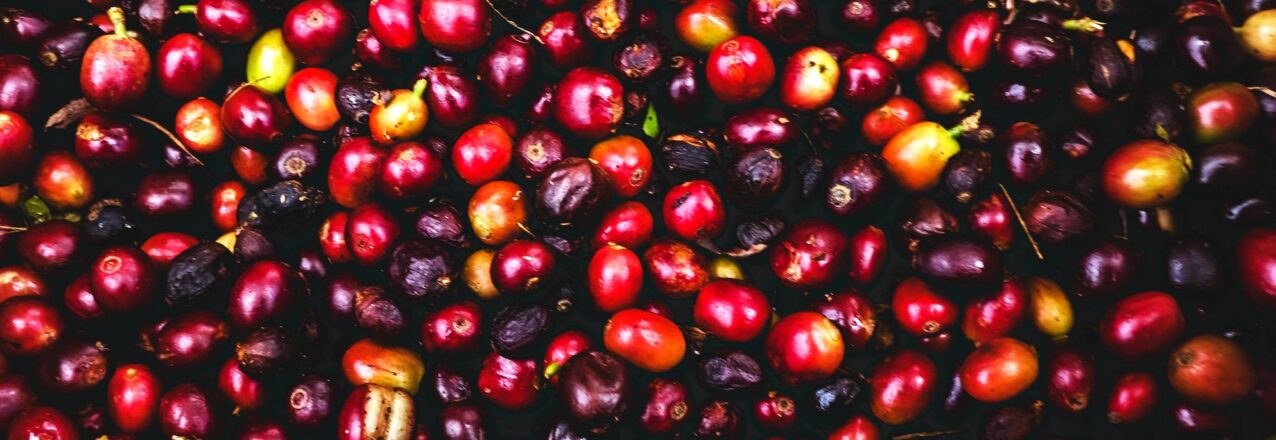USAID is promoting women and young coffee growers in northern Cauca, raising the quality of their coffee and opening doors in global markets.
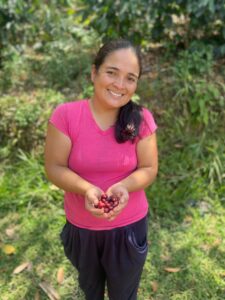 “We as coffee growers work for the common good. More than coffee, it is us, a part of the countryside who are taking care of the environment,” says Fanllany Méndez, spokeswoman for the coffee growers association Asoprodig, located in Santander de Quilichao in the heart of Cauca, one of Colombia’s most productive coffee growing regions.
“We as coffee growers work for the common good. More than coffee, it is us, a part of the countryside who are taking care of the environment,” says Fanllany Méndez, spokeswoman for the coffee growers association Asoprodig, located in Santander de Quilichao in the heart of Cauca, one of Colombia’s most productive coffee growing regions.
Women from Cauca like Fanllany Méndez have always seen coffee as their best option to help their families and get ahead. At 31 years of age, Fanllany is a community leader who encourages other women in Asoprodig to plant coffee, improve their skills, and promote marketing.
“Thanks to coffee I was able to study, and thanks to it I will also be able to give my children an education.” says Fanllany Méndez, a coffee grower from Cauca.
The hard work paid off this year when Asoprodig was chosen to participate in the 12th version of the Specialty Coffee Fair and Competition of Cauca. In the event, 10 small coffee grower associations participated for the first time, allowing international buyers to try their specialty coffees.
Winning New Markets
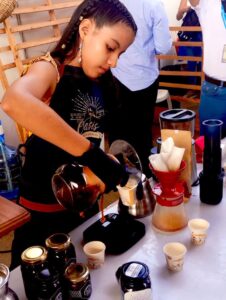 Fanllany Mendez and the 10 associations participated in coffee cupping, exposition of production machinery, and business meetings with buyers from Taiwan, South Korea, Mexico, Peru, China and Colombia. The coffee growers, who a decade ago had no market channels available, came to the fair to prove that in the municipalities of Northern Cauca are also producing specialty coffee with added value.
Fanllany Mendez and the 10 associations participated in coffee cupping, exposition of production machinery, and business meetings with buyers from Taiwan, South Korea, Mexico, Peru, China and Colombia. The coffee growers, who a decade ago had no market channels available, came to the fair to prove that in the municipalities of Northern Cauca are also producing specialty coffee with added value.
“In Cauca there are many families that depend on coffee, and the beans offered in this fair represent the best qualities we have,” Méndez said.
Under normal circumstances, the small growers end up selling their coffee to local buyers. Thanks to the event, three Northern Cauca coffee associations sold coffee lots to international buyers two more are under negotiation. In addition, the National Federation of Coffee Growers is leading the negotiation of 10 coffee lots from the 10 associations from the region.
Effective Partnerships
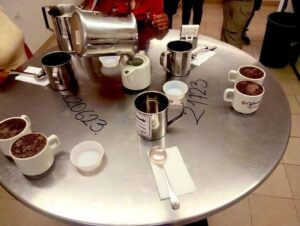
The fair forms part of a public-private partnership in the coffee value chain of Northern Cauca, which was facilitated by USAID in 2021 through the Land for Prosperity Activity. The PPP includes the Mayor’s Office of Santander de Quilichao and the National Federation of Coffee Growers, among other public and private actors.
The PPP is valued at more than COP $8,340 million (USD $3 million) and includes over 1,000 coffee growers from five Northern Cauca municipalities. The partnership is an example of USAID’s 20 years of support for Colombia’s $3 billion coffee sector. As the country’s third top export, coffee has the potential to promote formal economic opportunities in one of the Colombian regions most affected by illicit crops.
This year, in conjunction with the Mayor’s Office of Santander de Quilichao, USAID is emphasizing the promotion of Café Asociativo as an innovative initiative. The strategy promotes coffee from the PPP’s smallholder coffee farmers and seeks to promote new technologies and collaboration to improve production, quality, and open new markets.
“For the first time, our growers have the opportunity to participate in the fair’s coffee auction, following almost three years of effort and dedication. This is generating new business and opportunities for our coffee growers, but above all for the youth of our region,” says Lucy Amparo Guzmán, Santander de Quilichao’s mayor.
A Link to Rural Youth
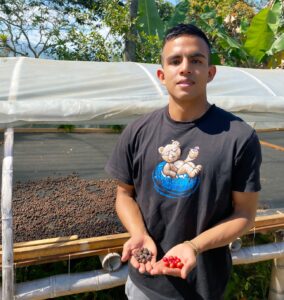 Santiago Samboní is a 21-year-old who has always grown coffee with his mother and grandmother on their farm located in the rural area of Santander de Quilichao. For Santiago, being a successful coffee grower is more than just production, it’s about training and acquiring knowledge that can improve the process. Today he is studying to become a food engineer.
Santiago Samboní is a 21-year-old who has always grown coffee with his mother and grandmother on their farm located in the rural area of Santander de Quilichao. For Santiago, being a successful coffee grower is more than just production, it’s about training and acquiring knowledge that can improve the process. Today he is studying to become a food engineer.
“We have to understand that coffee is not only picking and selling, but adopting a broader approach to improve productivity in the farms and then our income,” says Santiago Samboní, young coffee grower in Santander de Quilichao.
“All this growth is thanks to the training and support from the PPP, which highlights trainings for youth and allows us to continue working in agriculture.”


